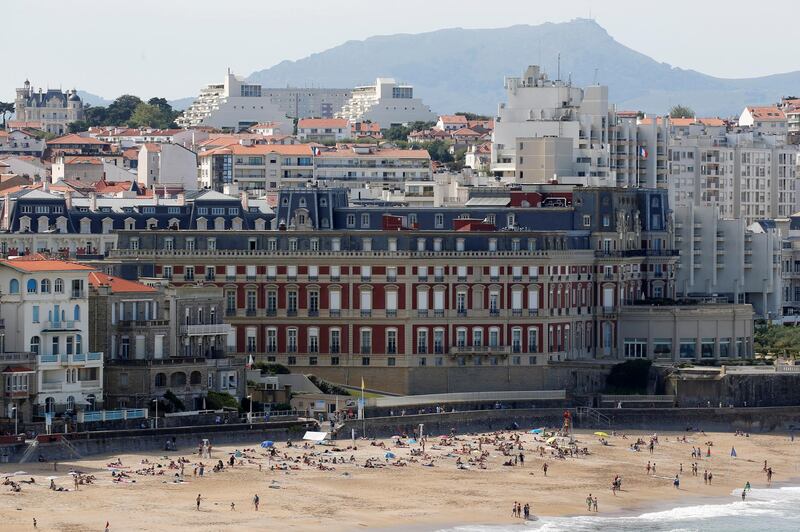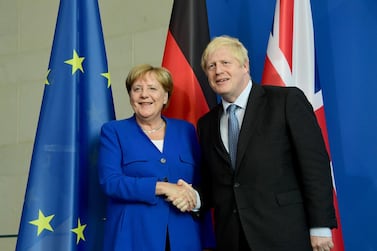US president Donald Trump’s assault on the established global order is set to resume this weekend as disputes over climate change, trade and Iran further erode the decades-long consensus among the world’s richest nations.
Leaders of the G7 nations will gather at the upmarket French coastal resort of Biarritz protected by more than 13,000 security officials to prevent disruption from environmental and anti-capitalist protesters.
The greatest discord, however, is expected at the five-star Hotel du Palais where Mr Trump’s global vision is set to be challenged in the luxurious salons by other leaders from the 44-year-old elite club of nations.
Mr Trump is likely to hear a largely unified message on Iran from the other delegates, including the European Union, France and Germany, who are seeking to reduce tensions with Tehran but are unlikely to secure any concessions from the US, said analysts.
Further rifts over trade and climate change – the topic championed by conference host, French President Emmanuel Macron – also appear unlikely to be bridged.
Political chaos in Italy, the absence on medical grounds of Jean-Claude Juncker, the EU’s most senior official, and the Brexit spat between the bloc and G7 debutant Boris Johnson, the UK prime minister, has added to the sense of pessimism.
“Success will be to not make things worse,” said Dr Tristen Naylor, a G7 expert at the London School of Economics. “The G7 has gone from being an organisation that drives global governance into one fighting a rearguard action against the dismantling of the western rules-based order.”
The last two summits have been dominated by Mr Trump’s wrecking-ball global diplomacy after he refused to back climate change commitments in 2017 and then last year declined to sign up to the traditional final joint statement.
The meeting is likely to end again without the traditional joint statement owing to disagreements between member nations over trade, a Japanese government official told Reuters.
France has put protection of the environment at the heart of this year’s summit in what is seen as a direct rebuke to Mr Trump.
Mr Macron has sought to fill the hole left by US climate change scepticism by leading the charge for multinational action against global warming.
But Mr Macron faces protests from protesters who claim that his actions have failed to live up to the pledges he made.
Activists plan a parade on Sunday brandishing some 127 portraits of the president snatched from town halls across France in a “take down Macron” protest. More than 50 people are scheduled to go on trial for their roles in the portrait snatch.
“He is seen as the world champion of the earth but in fact he is not taking concrete action,” said Pauline Boyer, a spokeswoman for the protesters.
They will protest in the neighbouring town of Bayonne, owing to the tight security cordon placed around the conference venues in Biarritz. Police will be backed up by soldiers and drones to ensure they are unable to confront the world leaders.
Biarritz’s airport and station will both be closed, streets barricaded, the main beach closed to the public and residents forced to show badges to access their homes.
“We will not tolerate any serious trouble,” French interior minister Christophe Castaner told reporters.
Violent anti-government "Yellow Vest" protests convulsed Paris and towns and cities across France late last year and the first half of 2019, challenging Mr Macron's authority and forcing some policy reversals. Rights groups accused the police of excessive force in their handling of the unrest.
The US president has already caused waves before the meeting by suggesting that Russia should be re-introduced to the G7 group – France, the US, Britain, Germany, Canada, Japan and Italy - after its expulsion in 2013 for the invasion of the Crimea. Seven other nations, including Egypt, have also been invited to take part at Biarritz.
The conference comes with Mr Trump at odds with the EU over its handling of the tanker crisis in the Gulf and the seizure of an Iranian-owned tanker, the Grace 1, by British marines off the coast of Gibraltar.
A Gibraltar judge ordered the ship to be released last week after refusing a US request to continue the detention of the ship.
The crisis has meant that Mr Trump is unlikely to be in a position to give ground at this week’s G7, said Sanam Vakil a senior research fellow in the Middle East North Africa programme at the Chatham House thinktank.
“Iran will be on the G7 agenda. Mr Macron is trying to lead the charge on Iran and would like to obtain an agreement from the Trump administration and the Iranians to freeze the current tensions,” she said.
“That’s something that will be very hard to achieve this weekend. It’s a bit early to expect a big shift in the US position. President Trump is really focusing on his re-election.”








